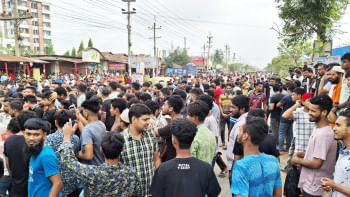Forays into the Past

In his five-decade long career as a teacher of the English department at Dhaka University and at other institutions and as a scholar, Professor Fakrul Alam has had countless grateful students and admiring readers of his scholarly works that are not merely scholarly in a literary sense but are also personal and public. The title, Once More into the Past, derives mostly from the personal section of the book. In it, Professor Alam recalls memories of his parents, grandparents, a street of Dhaka, a travel to Australia and others. A particular memory of his father is the man's passion for Tagore songs, which he heard on radio early mornings and wanted to share with his children. The young Fakrul at that time did not warm up to his father's enthusiasm. At a later time, he acknowledges, he did become a huge fan of our national bard's songs. His father died many years later. Professor Alam does not include too many details of the event, but he mentions a well-known Tagore song that captures his feelings. He also has an essay, originally delivered as a speech at an International Women's Day event (date is missing, by the way), that discusses his mother who was feisty, fiery, and supremely dedicated to the education of her children, including her daughters—not a common trend among women of her time when resources were scarce among middle-class families and the male child usually got preferential treatment.
Essays on the two parents reveal a lot about Professor's Alam in the book. He came from a family that, unlike many others of his childhood, fostered imagination, music, and education among all the children. Senior Alam's gentle music-loving personality made Alam a lifelong connoisseur of Tagore song and other genres of music. All the articles in Once More into the Past show an imaginative approach and a striving intellect. The latter Alam most likely got from his mother.
The other essays are grouped into two sections: "public" and "literary." The public essays treat the founding history of Dhaka University, the language movement and its far-reaching consequences in Bangladesh, Karl Marx's changing views on India and Edward Said's somewhat limited reading of Marx as an orientalist, and the founder of Bangladesh, Bangabandhu Sheikh Mujibur Rahman. Alam's discussions on the last two topics are illuminating. Said's well-known critique of Marx is a contentious debate in postcolonial studies. To his credit, Alam succeeds in balancing the twentieth-century literary scholar's unflattering appraisal of the nineteenth-century thinker. His conclusion is prescient: "Marx will be celebrated . . . for the essential truths he conveyed about history and society. And Said? . . . he will be remembered as the father of post-colonialism for a long, long time."
The last four essays of the public section are on the father of Bangladesh, who is simply known as "Bangabandhu" (friend of Bangladesh) to his people. The essays treat the great leader's untimely death in 1975, his murder by a gang of military officers; his rural roots that inspired him into politics; his university days; his countless imprisoned days; and his writings. An assessment of Bangabandhu's life and achievements is a challenging task. Though not an historian, Alam attempts it in the few articles he has on the man and succinctly presents to his readers the Bangabandhu who "appear[s] only once in an epoch."
Alam deals with a wide variety of themes in his literary essays. These include the feminist scholar Elaine Showalter; Shakespeare, whom he distinguishes as "the world's Biswa Kobi; the uneasy status of English education in post Bangladesh; the expatriate Indian author Nirad Chaudhury; and Alam's colleagues and friends and their works.
Highly pertinent in the education policy of Bangladesh is his "Bengali, English and the Anxiety of Influence." Alam discusses here the status of English in Bangladesh. He aptly recognizes that the language movement that led to the murder of unarmed Dhaka University students by the police on 21st February, in 1952 gave the prime political impetus to the birth of Bangladesh in 1971. His observation that misplaced linguistic nationalism that cornered English in the seventies and eighties is also quite accurate. When he speaks about "communicative English" that DFID/British Council promoted in the nineties, the reader wonders what does the British Council have to do with the medium of instruction in the education of Bangladesh? Alam does not address this issue adequately in his article.
Alam notes in "Anxiety of Influence" that before 1970, there was no conflict between Bengali and English in education, but English was demonized after Bangladesh became independent in 1971, the origin of which was a mistaken jingoistic perception of the language movement. He mentions all the events that promote Bengali in the country's culture; he points out as well that none opposes the study of English. He is obviously right. It is hard to see the reasoning behind shelving English so Bengali can have a breathing space. Bengali is the language of Bangladesh, will continue to be so forever, and will be in no danger of extinction. As the most widely accepted world language, English, however, must not only be promoted but embraced wholeheartedly because, as Alam indicates, it has immensely benefitted Bengali literature and other aspects of its culture and education in the past and will do so in the future.
The articles in Once More into the Past are informative and insightful. The range of subjects that the book covers is impressive. Alam's lucid writing makes the book accessible to young readers, and his deft handling of complex issues of culture, politics, and literature rouses the experienced ones.
Farhad B Idris is Professor of English at Frostburg State University.

 For all latest news, follow The Daily Star's Google News channel.
For all latest news, follow The Daily Star's Google News channel. 



Comments